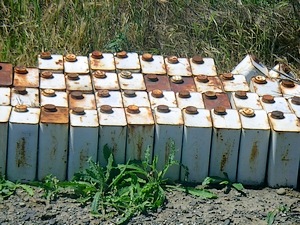Studying the diversity of New Zealand’s freshwater fisheries for the last 30 years suggests even the exotic locales are struggling mightily.
Overall, at a national scale, the health of fish communities declined between 1970 and 2007, especially over the last decade (2000 to 2007). The biggest decreases in the health of fish communities were in rivers in mostly pastoral (farming) or urban areas.
Farming could very well be the weapon that quashes our meager resistance to land exploitation and pollutants. Everyone understands eating – and naturally wants to keep doing so, which puts the battle of clean water versus plentful lettuce on a unique plane – against a foe we’ve only begun to understand.
The resource-rich, food poor countries like China, Saudi Arabia, and other Middle Eastern countries are buying agrarian land in more temperate longitudes to ensure their foods supplies.
You pump their gas, and they pump your water …
Lacking water and arable land – but rich in dollars and oil, makes for a heady mixture that ensures salmonids will see no respite anytime soon – despite their out-of-the-way home…
A report in May, co-authored by international agencies estimated that nearly 2.5 million hectares (6.2 million acres) of farmland in five sub-Saharan African countries has been bought or leased since 2004: an investment of $919.98 million.
 Africa and South America comprise the bulk of existing sales, but we’re just entering this new paradigm and have little idea how virulent the trend will become.
Africa and South America comprise the bulk of existing sales, but we’re just entering this new paradigm and have little idea how virulent the trend will become.
Cities are toxic, but we’ll continue to mitigate the obvious pollutants as we’ve been indoctrinated to their ills for the last 30 years. What city people don’t realize is that farms can be just as toxic – and have less controls or monitoring than industrial chimneys and sewage treatment plants.
Which are the Usual Suspects…
Wading through farm chemicals offered me a unique perspective of the issue, and while I still eat lettuce – there are times when I wonder which resource is the most precious.
Plows and pavement both terraform the environment into something other than native, rendering the stream less diverse than it once was, only the fellow behind the plow isn’t percieved as some sinister corporation fielding a bevy of legal firms to whitewash transgressions.
Welcome to the 800 pound gorilla in our future.

In the meantime,what’s being done about crossing the puny salmonids with the mighty carp ? They’re taking over the best waters already, they’re better fighters, you can’t eat either species, so what’s the diff ? Let those spoiled Kiwis get in step with the times.
Good point. We’ve got triploids already, might as well cross the two and get a “mule.”